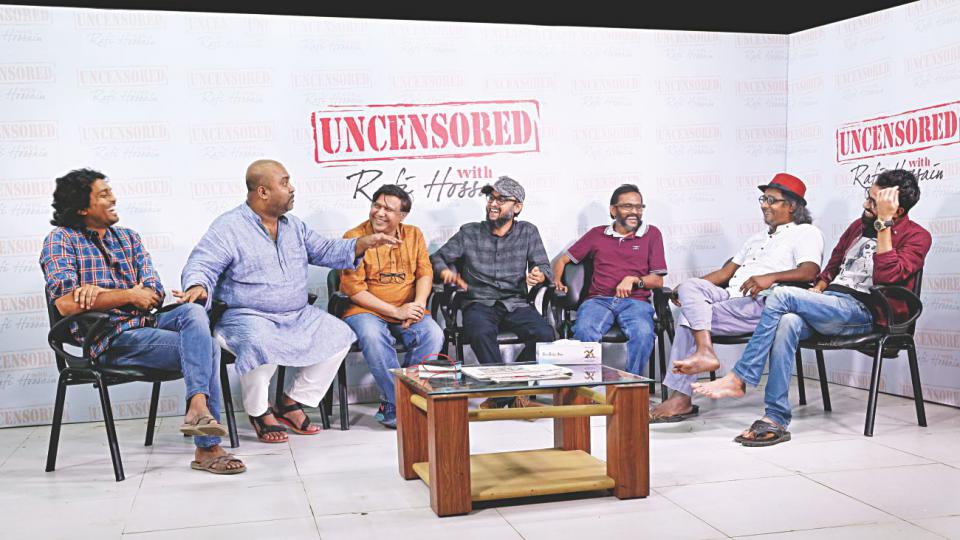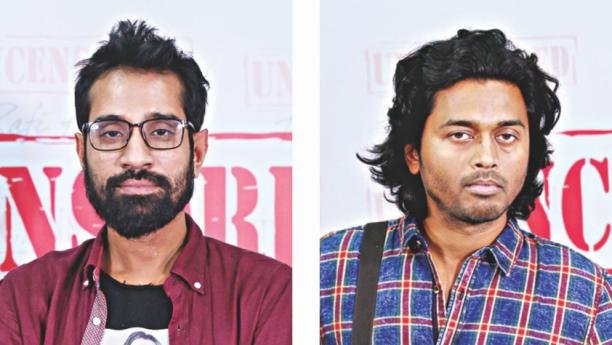Doob: The Frontier of a New Wave of Cinema
'Doob: No Bed of Roses', released on 27th October, has already taken the country by storm. Receiving a plethora of positive reviews from critics and fans alike, 'Doob' is considered by many as Mostofa Sarwar Farooki's best work yet and the best Bangladeshi film released this year. In this exclusive interview with Star Showbiz, Mostafa Sarwar Farooki talks about the creative processes involved in film direction, as well as the challenges he faces when attempting new projects. He is joined by other prominent directors of the current film industry; Amitabh Reza Chowdhury, Gousul Alam Shaon, Mejbaur Rahman Sumon, Nurul Alam Atique and Animesh Aich. In a lively discussion, these directors of the present talk about their thoughts on 'Doob: No Bed of Roses'.
Rafi Hossain: Out of all the films I have watched of Sarwar, I deem Doob to be his greatest work. So I feel the need to personally thank him. I hope he continues this line of success. Now, I am opening the floor, the directors with me are entirely free to share their own opinions.
Nurul Alam Atique: Congratulations are in order to Sarwar for presenting us with a movie such as Doob. It was truly a unique piece of work at this day and age. Ignoring any comparisons with Doob with any of the recent films, I would say I felt, in one word, “peace” through the entire runtime.
Gousul Alam Shaon: In my personal opinion, I also think that this is Farooki's best work. I think such a film was needed for this country, and it broke the mold of typical movies we are all very used to. From the perspective of our mainstream media, the narrative and timeline presented in films such as Aynabaji, Dhaka Attack, Oggatonama, Doob and hopefully, the upcoming Halda, are unique and something we desperately needed. It gave me the brain-tingling excitement I get from classical music, which I am a huge fan of.
Amitabh Reza Chowdhury: While everyone is focusing on the positives, I need to emphasize on some other matters. It cannot be denied that we are all very close friends. So when I watch a movie made by a friend, I see it as a friend would. Even when I go abroad to international film festivals, my connection with Sarwar bhai is what makes people more curious about my films. The amount of appreciation I feel for Sarwar bhai is something indescribable. The revolution we are trying to start by creating unique films was spearheaded by him. He had encouraged all of us to work harder a long time ago, but we didn't listen at first and that caused our progress to significantly slow down. But now it's undeniably clear that the path to international films is being paved by Sarwar bhai. His contribution is something that cannot be replaced and isn't in a place to be discredited by any means.
Rafi: And what did you think of Doob?
Amitabh: I considered it a very mature film. At this moment the sheer enjoyment we feel from this film is something we should only focus on right now. Instead of needlessly criticizing Doob, what we should be focusing on is what we can do from here on out. We need to keep moving forward.
![the_frontier_of_a_new_wave_of_cinema_2.jpg]
( )
)
Animesh Aich: Whether a film pleases you or frustrates you, it takes time to build that up. When I want to watch Doob, I realized the enjoyment was there from the beginning to the end. The build-up of the story was something I found especially noteworthy, especially with the inclusion of effective elements such as silent moments. In the hall, the person beside me was crying. Maybe the film connected with him in one point or another. I think what's more important than anything else is the reaction of the audience. The fact that Doob made someone so emotional is a testament of the quality it possesses. The language portrayed by the acting was brilliant, something only possible by an exemplary director.
Mejbaur Rahman Sumon: As directors I feel that we tend to follow the path opposite to the norm. Doob is the kind of film that shows the way forward and takes us in the right path, which applies to all of us present here. When I watched Doob, I felt that the plot progression was smooth and that amazed me. The characters, story, music, cinematography and the buildup were exemplary. I think if we keep moving this way we can achieve something extraordinary. By using Doob as an example, a new director can learn the tricks of the trade easily.
Rafi Hossain: Now let's listen from the man of the hour: Farooki.
Mostofa Sarwar Farooki: Speaking from personal experience, I was once very frustrated with filmmaking and wanted to quit it for good. I used to go around places with friends making up fake stories and random scripts, which ended up acting as my filmmaking classes. Our dream was to tell a story in our own way. Eventually I met other people and directors, and collectively we wanted to say our own stories. I kept at it and reached where I am today, but of course, the other works of our local directors helped me too. The feeling of challenge and inspiration I received from other recent films is what made me want to do better. It doesn't matter how old any of us are, we have always been inspired by each other's work. This is a very important time for us and we shouldn't let this opportunity for development pass us by.
Amitabh: One notable thing is how the films have grabbed the attention of the viewers lately. The anticipation the fans have for each new film is certainly more than it was in the past.
Atique: I agree with Sarwar with what he said about needing to create your own story. But just as self-criticism is important, using your own work as reference is also important. You must look back at your own work and see how you mature as time passes. In terms of cinema language, Sarwar has certainly matured. The regional ambience he has exuded in the past isn't seen in Doob, which is something I commend. He has discovered himself in a new way.
![the_frontier_of_a_new_wave_of_cinema_1.jpg]
( )
)
Rafi: Do you think you have re-discovered yourself?
Farooki: That's difficult to say. I think such a discussion is taking place because of the characters. There is a lack of communication between the characters which gives the need of a dramatic narration. The conflict cannot be created on the surface without any suspense. I think this use of language between the characters is what made people deem Doob to be such a mature film.
Sumon: The direction Farooki bhai is taking is something I think to be the right one. If we follow his strategy, I think we can all find success in portraying our own stories. I also deem Farooki bhai as someone who is constantly on the journey to find new ways to express him. I deem such a creative process very important for a director's development.
Shaon: In my opinion, people develop in two very different ways. There are people who find inspirations by going to different places, but there are also people who find themselves through self-experimentation. I think Farooki is the latter. It is noticeable how different Doob is compared to his earlier works, which is something astounding, honestly. Doob in specific gave the feeling of Eid; the excitement it gave me was something I haven't felt in a long time.

Animesh Aich and Mejbaur Rahman Sumon
Amitabh:It is also important for us to have a Bangla film featured in big-name theaters in India. This is something that inspires us to pursue our career as directors further. Why can't we also achieve international fame? We definitely can.
Animesh: Everyone has already summed up the best aspects of Doob brilliantly, I will just point out how much it means for us to be in the same room having such a lively discussion. The inspiration we are feeling from each other is very important.
Rafi: Farooki, any last words to wrap this up?
Farooki: I want to thank all the fans for always supporting and loving our work. When we read a story, we don't have specific criteria to fulfill. But in the case of films, we have been given a near-impossible expectation to live up to. There are countless stories around us, some you will like, some you will hate. But please do express your pleasure and displeasure, because productive discussions are needed for us to move forward and make better films in this country. Hopefully, 5 to 10 years later, people all over the world will know that there is a Bangladeshi new wave of cinema..
Hi! I am a robot. I just upvoted you! I found similar content that readers might be interested in:
http://www.thedailystar.net/showbiz/cover-story/doob-the-frontier-new-wave-cinema-1489282
nice
follw me friends,